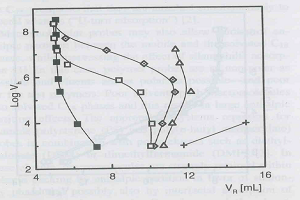
Berek D
Slovak Academy of Sciences, Slovakia
Title: Evaluation of high-performance liquid chromatography columns retentivity with help of macromolecular probes
Biography
Biography: Berek D
Abstract
The retention properties of high-performance liquid chromatographic (HPLC) columns belong to their most important characteristics. To test and compare the HPLC column retentivities, diff erent series of low molar mass probes bearing various functional groups are eluted in the appropriate mobile phase and the diff erences in their retention volumes, VR are evaluated. The nature of functional groups, overall polarity, basicity/acidity, etc., of the test substances are considered, as well as the size and shape of their molecules. However, the conclusions drawn from dissimilar sets of test substances may diff er remarkably. It seems that more unambiguous data can be obtained with series of chemical homologues as test probes, for example esters, which bear the same active group but their molecular size diff ers. Th e alternative approach considers application of oligomers, in which the active groups are repeated. However, the end-groups in oligomers can bias the results. Th e solution may bring polymeric test probes, in which the end-groups play negligible role. Polymer probes are available in diff erent both polarities and molecular sizes. Elution of series of polymers with distinct molar masses and sizes of their molecules in solution enables to independently evaluate both polar, adsorption and non-polar, partition properties of typical HPLC column packings such as bare and alkyl bonded silica gels. Plots of retention volume versus hydrodynamic volume of polymers Vh are constructed for the macromolecular probes with diff erent polarities. Such representation enables to compensate dependence of size of macromolecules in solution on their chemical composition and on eluent nature. The interactivity of columns is assessed from the courses of such dependences, which are denoted as universal calibrations. In the lecture, we will explain the principle of assessment of HPLC columns retentivity with the help of polymer probes and present typical examples of the procedure.

Publications
- Berek D (2003) Evaluation of high-performance liquid chromatography columns retentivity using macromolecular probes, III partition properties of C18 phases traced by polymers. J Chromatography 1020:219–228.
- Berek D (2002) Evaluation of high-performance liquid chromatography columns retentivity using macromolecular probes. J Chromatography 950:75–80

